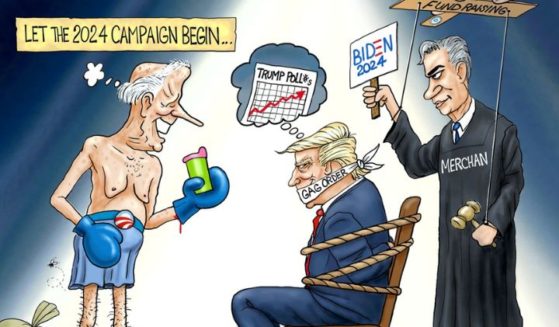NYT: Hollywood Isn't Woke Enough on Climate Change, Needs To Push Environmentalism Harder
Back in grade school, I think those of us of a certain millennial age were all forced to sit through “FernGully: The Last Rainforest.” If you’ve managed to miss this cinematic gem, picture the most preachy animated movie on deforestation you could make, then make it a bit more preachy and have Tim Curry voice the villain.
When Hollywood talks about the environment, this is how they usually talk about it. But to The New York Times‘ Cara Buckley, there’s a disturbing trend recently: Villains who want to solve pollution through eliminating a portion of mankind.
That, she says, is decidedly unwoke, and she found plenty of people who felt the movies weren’t doing enough to shape opinions.
“Humans ruined everything. They bred too much and choked the life out of the land, air and sea,” her piece last week — “Why Is Hollywood So Scared of Climate Change?” — began.
“And so they must be vaporized by half, or attacked by towering monsters, or vanquished by irate dwellers from the oceans’ polluted depths. Barring that, they face hardscrabble, desperate lives on a once verdant Earth now consumed by ice or drought.
“That is how many recent superhero and sci-fi movies — among them the latest Avengers and Godzilla pictures as well as ‘Aquaman,’ ‘Snowpiercer,’ ‘Blade Runner 2049,’ ‘Interstellar’ and ‘Mad Max: Fury Road’ — have invoked the climate crisis. They imagine postapocalyptic futures or dystopias where ecological collapse is inevitable, environmentalists are criminals, and eco-mindedness is the driving force of villains.”
Well, I guess it’s better than the evil real estate developer who’s looking to turn the youth center into a high-rise apartment. It’s not that these enviro-Nazi villains are omnipresent and if you need to give someone a plausible motivation for eliminating wide swaths of (if not the entire) human race, radical environmentalism beats boredom.
Think about this for a second. If Thanos has no motivation for wiping out half of the universe’s life, the stakes in the “Avengers: Infinity War” plot are kind of thin, no? King Orm’s decision to wipe out polluting humans in “Aquaman,” according to the screenwriter, was to give the character some depth.
“David Leslie Johnson-McGoldrick, one of the writers of ‘Aquaman,’ said using pollution as a motivator made Orm more relatable and less ‘mustache-twirly,’ and added, ‘It gave him some nuance.’”
Buckley seems to intimate that what we need is more mustache-twirling and more lectures on global warming — presumably in different movies, although Hollywood can make anything happen these days.
“More than ever, they’re missing the mark, often in the same way,” Michael Svoboda, George Washington University writing professor and author with Yale Climate Connections, said in Buckley’s piece. “Almost none of these films depict a successful transformation of society.”
And there’s the nut of the piece, if you were looking for it: Hollywood needs more, not less, didactic art, specifically about the environment.
Buckley notes that “Svoboda sees Orm as part of a trend that moves the climate crisis into emotionally familiar and comfortable territory. The villain is defeated and the audience feels relief, he said, not least because they have been let off the hook: People may be doing real harm, but the alternatives are worse.”
Incorrect. The actual lesson is that the environmentally Malthusian alternative — the idea that human growth far outstrips humans’ ability to steward the planet through that growth, and the villainous streak that causes the bad guy to think the solution to this is to kill a lot of humans — is deemed a worse alternative than people doing real harm.
None of these films, by the way, ever posit that there isn’t serious, earth-threatening harm being presented by human activity. There’s no climate denial here, or even the idea that maybe the peril is overblown. Humans are, as a whole, generally presented as doing irreparable violence to Mother Earth. The question is whether they deserve genocidal violence against them to save the earth.
If you spend your time watching “Blade Runner 2049” or “Avengers: Infinity War” in “emotionally familiar and comfortable territory,” you are a lot more emotionally immovable in the dark of the movie theater than I am. But then again, maybe you’re just absorbing right-wing dogma. From, um, the people in Hollywood.
“It plays into conservative talking points that environmentalists are out to reduce the pollution and restrict lifestyles and are genocidal,” Svoboda said. “They create mass murderers who are the only ones fighting climate change.”
Buckley says that most films that deal with climate change in a more “sober” manner are documentaries like “An Inconvenient Truth.” (That, I’ll remind you, was somehow made into a box-office hit even though it was drier than the Sahara and contained numerous predictions that were wildly off base, but I digress.)
But then there are the others, like “The Day After Tomorrow” and “Downsizing.” Oh, and other films that, for whatever reason, didn’t become hits: “Svoboda pointed to ‘Young Ones,’ a 2014 film starring Michael Shannon as a father eking out an existence in a drought ravaged world, as the rare film that showed humans adapting to global warming, but it barely made a blip,” Buckley writes.
Look, pretty much anything can be made into a watchable film, but as an elevator pitch, that doesn’t sound like a winner to me.
The answer, of course, lies in Hollywood telling us what to do in a better way.
“We need a pop culture ‘Forrest Gump’ movie now to wake people up,” actor and director Fisher Stevens, who’s made environmentalist documentaries with Leonardo DiCaprio, told Buckley. According to him, that’s “because the fossil fuel industry is doing everything to stop us in America from believing that fossil fuels are causing climate change.”
“So why aren’t there more realistic, or semi-realistic, or, dare it be suggested, hopeful films about climate change?” Buckley asks.
“Because, several directors said, it is hard to find financing for movies that risk being real downers and challenge audiences to change their ways. Because mass extinction is soul-crushing and people seek out entertainment to escape.”
Except that (spoiler alert) one of the films we’ve talked about here — “Avengers: Infinity War” — specifically ends with soul-crushing mass extinction.
Now, granted, they were able to reverse it in the next film, but the point still stands: You can mix popular entertainment with some downers and people will still come out and see them. “Forrest Gump” didn’t exactly end with unmixed joy, you may recall.
“Chinatown,” “Terms of Endearment,” “Stepmom,” “Vertigo” — I can list you plenty of legendary films that don’t end on an emotional high. If you want, make a “Love Story” about the environment. Tagline: “Reducing your carbon footprint means never having to say you’re sorry.”
If this seems mostly like an excuse for this writer to talk about how Hollywood isn’t making enough climate change films for her taste, here’s another spoiler alert: It is.
It’s hard to see this as a problem because the films in question don’t portray environmentalism as a choice between a carefree humanity that has no environmental issues to fret about pitted against a villain or villains who, through unwarranted pessimism, believe humanity is destroying the earth.
Instead, the tacit takeaway from most of these films is that the conflict is between a humanity that has serious environmental problems but doesn’t know what to do about them and a villain or villains who will solve it for them — by killing all or most of them. In her opening graphs, Buckley even admits this much without saying it outright.
So, if you get your messages from the movies and you come away from these films ready to search Craigslist for a 2005 Hummer H2, you probably got the wrong message.
But therein lies the problem — people don’t change their opinions because of what Hollywood tells them.
Didactic art is quickly seen for what it is. Just ask any of us who had to sit through “FernGully.” We have a robust media structure in the Western world that’s more than happy to talk about climate change in the terms Buckley would want them to. Hollywood is doing a better job of it than she’s giving them credit for, I would also posit.
If she thinks people still aren’t getting the message, perhaps she ought to consider the possibility that’s not because it’s not being shoved in their faces enough, but instead because it’s nakedly being shoved in their faces.
Buckley closed the piece by noting what the people at the British Academy of Film and Television Arts have been up to lately: “This spring, BAFTA released a study showing how many times ecological terms appeared on British television in one year (the report did not include film). ‘Climate change,’ for example, appeared more than ‘zombie’ but trailed ‘gravy,’ and was utterly trounced by ‘queen’ and ‘tea,'” she wrote.
“The academy also started an initiative, Planet Placement, exhorting film and television content creators to help ‘make positive environmental behaviors mainstream.’ With screen industries’ massive reach, they said, ‘it’s a chance to shape society’s response to climate change.’”
Oh great. Another reason to ignore British film that isn’t Guy Ritchie.
“The past 25 years of the environmental narrative is about sacrifice and doom and not doing what you want and not getting what you want,” Aaron Matthews, the head of industry sustainability at BAFTA, told The New York Times. “We don’t think that’s the right tone to get people over the line.”
Maybe they’ll find that tone and get all of us slackers over the line. Maybe they’ll make superhero movies where the villains want to kill 75 percent of humanity to keep fossil fuels viable and the people of Wakanda defeat him by creating a vibranium reactor — but then warn us that vibranium is for the Wakandans alone and that we need to start relying on solar, wind and hydro power before we destroy the planet. Maybe that’ll change some minds. Or not. Probably not.
All I have to say is this, though: If environmentalists have been wronged by Hollywood because they’re portrayed as wanting to destroy humanity, then real estate developers have earned a massive apology over the constant insinuation that every living, breathing moment, they’re all scheming to destroy youth centers across America. That’s the real scandal here.
Truth and Accuracy
We are committed to truth and accuracy in all of our journalism. Read our editorial standards.












